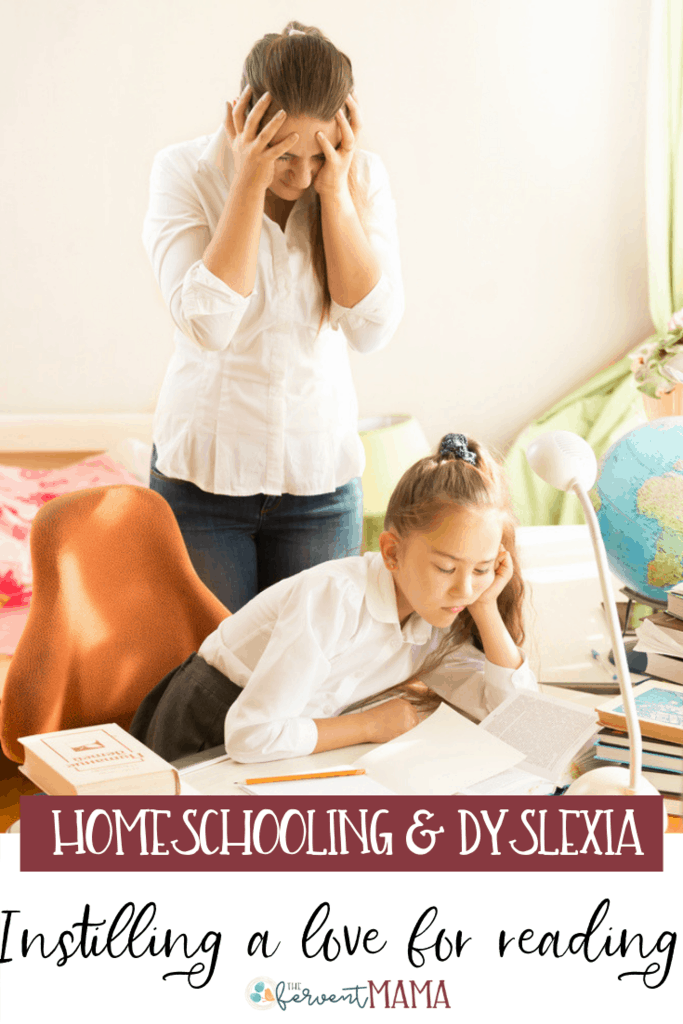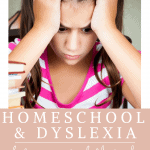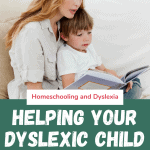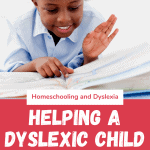5 Tips for Helping Your Dyslexic Child Enjoy Reading
The Fervent Mama uses Affiliate Links. See our disclosure policy here.
There’s a difference between kids who aren’t interested in reading, have trouble reading, and those who struggle because of an underlying problem. As homeschooling parents, how do you decipher which one of those it is?
If you think that your child is struggling with reading, spelling, writing, or comprehension because of dyslexia, we’ve put together these resources to help point you in the right direction.
NOTE: Children with dyslexia typically struggle with reading the most, so we’re going to focus on helping your dyslexic child enjoy reading!
Encouragement for the Homeschool Mom

Sometimes it takes a little mother’s intuition to guide us on the right path. It may be that our kids just need a little encouragement, sometimes a little sternness, and sometimes we just know that there’s something else up.
What do you do if you think your child has a learning disorder, like dyslexia, that is hindering them from progressing?
The first thing that you should do is explore your options. Maybe you may need to try a new approach, a new curriculum, a better structure, consult groups, support, or even see a specialist.
Dyslexia and Homeschooling
There are different levels of dyslexia, and there isn’t a single test to confirm a diagnosis. Understood.org has a great article about Understanding Dyslexia that can help explain.
Although dyslexia has to be diagnosed by a professional, here is a good video example of a dyslexia evaluation that may help you determine if your child is a candidate.
There are many curriculums, tips, and support options out there that you can take advantage of as well. You can even take a look at some of them below.
Helpful Blog Posts for Homeschooling a Child with Dyslexia:
- Jacqueline from Deep Roots at Home talks about their experience with Dyslexia Games.
- Lara at Everyday Graces shares her experience with Mind Games.
- ToriAnn from Homeschool to Homeschool wrote a book review about “The Dyslexia Advantage”.
Homeschool Curriculum for Dyslexia:
- Homeschooling Dyslexia has a great post about her curriculum choices for her kids with dyslexia.
-
50 Orton-Gillingham Based Lessons for Struggling Readers and Those with Dyslexia
This is why we homeschool. To give our children the best education, to focus on their learning and to encourage them in the faith. You can homeschool a child with dyslexia- it does not define them.
Dealing with the emotions of Dyslexia
As homeschoolers, we already struggle with so many emotions. Sometimes it’s the wonder of “doing enough”, sometimes it’s the pressure of others who don’t understand, sometimes even wondering if we made the right choices in homeschooling in general.
Then when we see our children struggling, everything seems magnified and you wonder, “Am I really equipped for this?”
I know where you are, mama. I’ve been there too. As a matter of fact, nearly every homeschool parent has been in your shoes as well. So take comfort in knowing that you ARE equipped, and you have a global group of supporters in your corner.
The good thing to consider is that dyslexia isn’t considered a disability and does not affect intelligence. Which means that your child can succeed, despite the confirmation of dyslexia. Although, that does not mean that dyslexia will not be a struggle.
Dyslexia can cause children to have to work a little harder than their peers, causing some to struggle with anxiety or embarrassment. Be a cheerleader for your child, they may need that extra encouragement.
But also know their potential, and don’t let them downplay it by using the diagnosis as an excuse!
For a mom, it can be a little disheartening. But as a homeschooler, you can be relieved to know that it wasn’t you’re lack of ability to teach or instruct. You are not the cause for the struggle. Be empowered to know of all the resources that you can take advantage of.
Tips to help your dyslexic child enjoy reading
An aversion to reading is a problem that any child dyslexic or not should work hard to overcome. Learning mostly comes through reading of some form and the more veracious a reader, the more knowledgeable one obtains.
Most homeschooling moms work hard to instill a love for reading in their child, but is it possible to have your dyslexic child enjoy reading?
Yes! But, I am not only here to tell you that it is possible; I am here to give you 5 tips to help you make it possible!
1. Ask These Questions
What does my child enjoy? What kind of movies does he/she like? What kind of plot do they find interesting? Realism, fantasy, mysteries, dramas? What kind of characters do they like?
Find a simple book about these things. Finding content that your child enjoys and wants to read every day can be very trial and error, so don’t give up if they don’t enjoy the first book that you pick out.
Google searches, Pinterest, and Homeschool Facebook Groups are great for discovering new things, asking questions, and getting good advice!
2. Form Good Habits
If the book you picked out is on their reading level, and they do not enjoy it; make them finish it. They will need to read a lot of material in their life that they do not enjoy. It’s just a fact of life.
Being stern with this can teach them so many things about themselves, and about the world around them. Remember that they are forming habits now. Don’t allow them to form a habit of giving up.
3. Be Present
It is NOT a cop-out to do the “you read one page and I’ll read one-page” thing. Sometimes it can also be very good practice to read a chapter to your child and then have them re-read it out loud to themselves.
For some people, finding content that a dyslexic child really loves can take a while. It can be discouraging but keep trying. There is an infinite number of books out there, don’t give up!
4. Encourage Reading Comprehension
Talk with your child about the characters and plots from the books you’re reading and listen to what your child has to say. This can help you better understand where your child is lacking, or in what areas they may need extra help.
This also teaches the child to pay attention to what’s going on, even the smallest of details. By discussing the book, you each learn a little more!
5. Set the Standard
Once you pinpoint the kind of books your child likes, let them read from the same author or series for two or three books in a row. Then, make them read one necessary but not fun book.
When trying to help a dyslexic child enjoy reading, it’s important that they get a whole bunch of enjoyable reading in, but it is also important that they do some necessary reading as well.
If you have been quietly (or maybe not so quietly) pushing aside the fear that your child will never want to read on their own and afraid what consequences that may have in their life; take heart! Just keep reading together.
With lots of patience and perseverance, trial and error you will eventually get there. One page at a time. You can instill a love for reading in your dyslexic child!

















